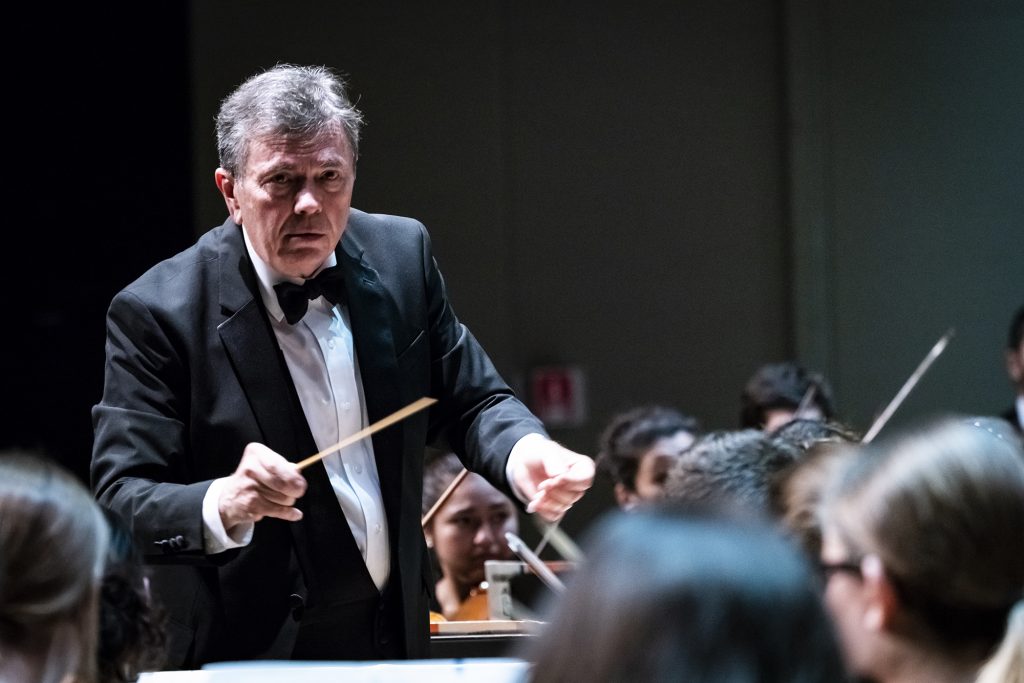Schwarz leads the Frost Symphony in a fiery and relentless “Rite of Spring”

Gerard Schwarz conducted the Frost Symphony Orchestra in Stravinsky’s Rite of Spring Saturday night.
Since Gerard Schwarz joined the faculty of the University of Miami’s Frost School of Music in 2019, he has led the Frost Symphony Orchestra in some fine performances. But the American conductor exceeded all previous efforts with a thrilling rendition of Igor Stravinsky’s Le Sacre du printemps Saturday night at UM Gusman Concert Hall.
When Stravinsky’s ballet score premiered in Paris in 1913, a riot broke out in an audience shocked by the music’s dissonance and harmonic audacity. Almost one hundred and ten years later, The Rite of Spring can still can give listeners a jolt in the best possible way. Stravinsky’s score changed the course of music and Schwarz’s reading brought out the work’s daring originality and sweeping dynamism.
Set to a scenario of a pagan rite with a sacrifice of a young woman, the music churns with primitive rhythms. Schwarz’s crisp pacing made every change of meter meticulously clear and precise. From the opening bassoon solo, wind details were lucidly projected and the brass roared in fierce tones without overpowering the full ensemble. Schwarz drew huge sonorities and astutely calibrated dynamics from the players, elucidating the shifting moods of Stravinsky’s creation.
The introduction to Part Two (“The Sacrifice” emerged languorously but with an undercurrent of tension. Individual instruments were strikingly clean and transparent. The concluding “Sacrificial Dance” was fierce and relentless with a dominant sense of terror. Richly burnished strings and a crackling percussion contingent stood out among a terrific ensemble effort.
Schwarz masterfully captured this landmark score’s bold panoply of instrumental colors and thematic invention. Far from sounding like a student ensemble, the players’ execution would have been a credit to any orchestra. This bracing performance was a high-water mark for Schwarz and the Frost musicians. One could hear a pin drop in the highly attentive audience and a beaming Schwarz and the orchestra were greeted with bravos and cheers at the performance’s conclusion.
On the concert’s first half, two of Schwarz’s graduate conducting students took the podium. Alberto Bade, currently professor and orchestral director at Miami-Dade College North Campus, led a sturdy accompaniment to pianist JingEn Chen’s performance of Beethoven’s Piano Concerto No. 3 in C minor.
Winner of the Frost School’s concerto competition and a doctoral candidate at the school, Chen is an agile player with a polished technique. Her approach was Mozartean, lighter than the emphatic orchestral playing under Bade. The second movement Adagio seemed overly deliberate but the syncopations of the final Rondo were vigorous and lively.
Chen is clearly a gifted player and continued experience and maturity will enrich her interpretive insights. One would like to hear her in Mozart or Chopin where her sense of delicacy and lyricism could come to the fore.
The program opened with Seven o’Clock Shout by former Frost faculty member Valerie Coleman. Written in tribute to frontline workers during the heart of the Covid pandemic, the score sings forth in the Americana tradition of Copland, Howard Hanson and William Schuman.
Opening with a lone trumpet and two arpeggiated harps, a flute cadenza leads to a jazzy chorale and shouting and clapping from the players. A trombone solo precedes a tumultuous climax. Coleman’s five-minute piece makes a fine concert opener. Yun Cao conducted a controlled yet rousing reading with fine playing from all sections of the orchestra.
Gerard Schwarz conducts the Frost Symphony Orchestra in Bright Sheng’s Tibetan Swing, Prokofiev’s Symphony No. 5 and Ginastera’s Harp Concerto 7: 30 p.m. February 11 at UM Gusman Concert Hall in Coral Gables. music.miami.edu
Posted in Performances
Leave a Comment
Sun Dec 4, 2022
at 11:55 am
No Comments




